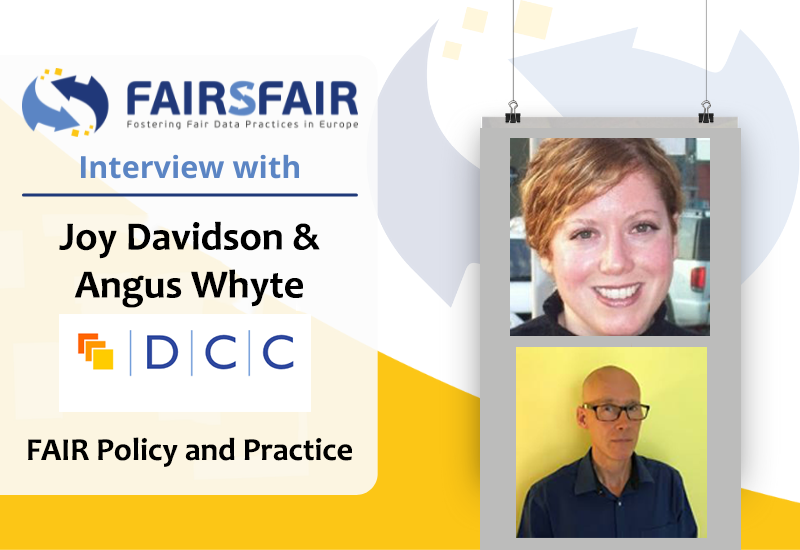Part of a series of interviews with FAIRsFAIR Work Packages
January 2022
Making research data more FAIR will provide a range of benefits to researchers, research communities, research infrastructure facilities and research organisations alike. However, the FAIRification journey face some challenges and its an evolving and progressive process. There are still many barriers to overcome during the implementation of FAIR. The implementation of data policies at various levels (nation, funder, organisation) will support the adoption of FAIR data practices.
Joy Davidson and Angus Whyte, from Digital Curation Center (DCC) and Leader of FAIRsFAIR FAIR Policy and Practices WP, assessed the policy and practice landscape, as well as provided support to guide necessary changes at funding body, repository and organisational levels to support increased production and use of FAIR data.
Get to know the work led by Joy and Angus to facilitate FAIR practices adoption.
During these 36 months, what are the main outcomes from your work? Could you please provide an overview of all this work?
This work package is led by the Digital Curation Centre and aims to assess and improve the current policy and practice landscape to foster a FAIR data culture. Partners on this WP included CSC - IT Center for Science Ltd. (CSC), Committee on Data of the International Council for Science (CODATA), Data Archiving and Networked Services (DANS), European University Association (EUA), University of Göttingen (UGOE), Research Data Alliance (RDA), SPARC Europe, UKRI - Science and Technology Facilities Council (STFC), University of Bremen, and University of Minho.
Our main activities have been geared around assessing the policy and practice landscape and then developing support to guide necessary changes at funding body, repository and organisational levels to support increased production and use of FAIR data.
ENHANCING FAIR DATA POLICIES
FAIRsFAIR carried out an analysis of data policies at various levels (nation, funder, organisation) looking to identify elements that support or hinder FAIR data practice. The analysis was published in November 2019 [D3.1 FAIR Policy Landscape Analysis]. Key fiundings include:
- Policies are not currently structured for machine readability
- Funding body policies are most influential on researchers’ behaviour
- Policies should be aligned with FAIR either explicitly or implicitly
Based on the results of the landscape analysis and building on previous work, FAIRsFAIR prepared a series of 22 practical recommendations for policy enhancement to support the realisation of a FAIR ecosystem. In early 2021, we issued an open call for policymakers at all levels who wanted to work with us to align their policies with the FAIR Principles. Over the second half of 2021, we worked with 20 policymakers (14 research performing organisations, 3 funding bodies and 3 national level initiatives) to assess their policies against our recommendations and provide some practical guidance on where alingment may be needed.
This work ultimately aims to reduce conflicting requirements across stakeholders, making the landscape easier to navigate and easing adoption.
TRANSITIONING TO FAIR DATA REPOSITORIES AND PROMOTING DATA STEWARDSHIP
Based on topics identified in our transition support programme for repositories [Deliverable 3.5], we have delivered a series of Repository Support Webinars. The webinars aim to help repository managers become familiar with FAIR-enabling practices. Each webinar provides an overview of a specific FAIR-enabling activity, shares information on recent developments within FAIRsFAIR and other initiatives as well as offering examples of good practice, practical tips and recommendations. Registration for the webinars is free and open to all however the main audience is repository managers and service providers.
We also developed a proposal for integrating metadata catalogues to support cross-disciplinary FAIR uptake and a report was released in October 2020 [Deliverable 3.7]. The proposal highlighted the potential value of DCAT v2 to support metadata catalogue integration. To test the proposal, a number of interviews were carried out with representatives from discipline specific repositories and aggregator services to get their sense of the potential feasibility of using DCAT and a number of challenges were identified. . The findings are outlined in D3.7 report which was published in November 2021.
How the community will benefit from them? Why they are useful and important?
We believe there are several communities that will benefit from added clarity we offer about the steps they can take, whether as individuals or with colleagues, to support the production and curation of FAIR data. The main communities that will benefit include data stewards, research data managers, especially those involved in training and capability building, and data repository managers.
These are communities of practice rather than research communities of course, but people in these roles are the human interface to the services offered to researchers by universities, other Research Producing Organisation, and external providers such as Research Infrastructures or Repositories. They have to deal with researchers at all levels and from many domains, so it fits FAIRsFAIR’s domain-agnostic role that we should try to support them, and complement the more domain-specific outputs from other EOSC projects, infrastructures, and coordinating fora such as RDA, GO-FAIR and indeed the EC and its various expert groups.
There has been a lot of guidance produced for these professional support roles in recent years. There have been a few real gems coming from the EOSC projects and elsewhere, and our landscape review offered pertinent examples. But we found that much of the available material has not caught up with the FAIR principles, does so at a strategic rather than operational level. We also found it difficult to get a sense of the maturity of initiatives relevant to FAIR. So we have taken some steps aiming to offer practical guidance on enabling FAIR data. We also offer examples of practice that we call ‘Implementation Stories’, and we believe these can inspire others to drive forward changes in their organisation.
